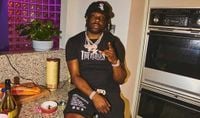Atlanta rapper Young Scooter was reportedly shot and killed on his 39th birthday, March 28, 2025, in a tragic incident that has left the hip-hop community in mourning. The shooting occurred near State Farm Arena, where the NCAA tournament was taking place, and local media reported that one person was injured in the incident. While multiple sources have suggested that the victim was indeed Young Scooter, whose real name is Kenneth Edward Bailey, authorities have yet to officially confirm his identity as of March 29, 2025.
Born on March 28, 1986, Young Scooter rose to prominence in Atlanta's vibrant hip-hop scene. His music career began in 2008, but he truly broke through with the 2012 mixtape "Street Lottery," which featured his hit single "Colombia." This track became a defining anthem of the trap genre, showcasing his raw, unfiltered style and the realities of street life. The success of "Colombia" led to an official remix featuring notable artists like Rick Ross, Birdman, and Gucci Mane, further solidifying his place in the industry.
Young Scooter's collaborations with prominent figures in the rap world, including Future and Young Thug, helped him carve out a niche in the genre. His guest appearance on Future and Juice WRLD's 2018 track "Jet Lag" marked his first entry on the Billboard Hot 100, where it peaked at number 72. Other notable songs in his discography include "Doh Doh" with Future and "Guwop" alongside Young Thug, Quavo, and Offset.
The news of his untimely death has sparked an outpouring of grief from fans and fellow artists alike. Close friends and collaborators, including Ralo and Playboi Carti, took to social media to express their sorrow. Carti posted a heartfelt tribute on Instagram, stating, "I GREW UP ON DIS SHIT SMH RIP. ATLANTA LEGEND," while Ralo simply shared a broken heart emoji in his story.
As the hip-hop community grapples with this loss, many are reflecting on the broader issue of violence affecting artists in the genre. The question looms large: Why do so many rappers continue to lose their lives tragically? From Nipsey Hussle to Takeoff, the list of artists taken too soon grows longer. Young Scooter's death adds to this heartbreaking trend, highlighting the dangers that often accompany the lifestyle portrayed in their music.
In an interview, Young Scooter once remarked, "The streets made me, but they also damn near broke me." This sentiment captures the duality of hip-hop: it serves as a voice for the voiceless while also confronting the harsh realities that can lead to violence and tragedy. The genre, which has been a source of empowerment for many, often comes with the baggage of street life, including conflicts and legal troubles.
Young Scooter's music was characterized by its authenticity, with a focus on the struggles and triumphs of street life. Tracks like "Life Support" delve into themes of betrayal and the cost of being too real, while "Married to the Streets" reflects a commitment to the lifestyle that shaped his identity. His song "Jug King" from the 2017 mixtape of the same name showcases his boldness and wisdom, resonating with listeners who understand the hustle.
Despite facing challenges, including a 2013 arrest for probation violation, Young Scooter channeled his experiences into his art. His raw delivery and minimalist flows resonated with fans, making him a cult figure in the South and beyond. His music continues to speak to those who have faced similar struggles, offering a glimpse into the life of an artist who lived and died by the culture he loved.
The circumstances surrounding his death remain unclear, with reports indicating that the shooting took place at the intersection of Luckie Street NW and Mills Street NW. A man was found with gunshot wounds and was taken to the hospital in critical condition. As the investigation unfolds, the community is left to mourn a talent who was at the forefront of early and mid-2010s trap music.
Fans have already begun to pay tribute to Young Scooter, sharing his music and reflecting on his impact on the genre. His iconic tracks, such as "Colombia" and "Street Lottery," serve as a reminder of his contributions to hip-hop. As the community comes together to honor his legacy, there is a collective hope that artists like Scooter can be protected and supported in an industry that often feels perilous.
In the wake of this tragedy, many are asking whether this marks a turning point for rap as we know it. The violence and drama surrounding the genre have reached a tipping point, prompting discussions about the future of hip-hop and the need for change. While some may view this as the end of an era, others believe that rap will continue to evolve, finding new ways to address the issues that plague its artists.
Today, as we remember Young Scooter, we honor not just his life but the music that will continue to resonate with fans. His commitment to authenticity and his ability to convey the struggles of street life will not be forgotten. In an era where many chase clout and popularity, Young Scooter remained grounded, delivering messages that spoke to the heart of the culture.
As we reflect on his legacy, let us play his music and celebrate the impact he made on the industry. Young Scooter’s voice will echo through speakers and hearts, reminding us of the power of storytelling in hip-hop. Rest in peace, Young Scooter. March 28, 1986 – March 28, 2025. You were too real for this world.







